


xxxxxTurkish rule over Egypt was established by Selim I in 1517 (H8), and remained in force until Napoleon invaded the country in 1798 (G3b). He defeated the Turks at the Battle of the Pyramids, but his stay was cut short by Nelson’s victory at the Battle of the Nile, which destroyed the French fleet and left his army stranded. With the departure of the French in 1801, and the British in 1802, there followed a power struggle from which Muhammad Ali, an Albanian officer serving in the Ottoman forces, emerged the victor. The Sultan recognised him as their viceroy in Egypt in 1805, and he quickly seized control, killing the leading Mamluk leaders, and reorganising his army and navy on European lines. After seven years of bitter fighting he gained control of Arabia in 1818, and then in 1820 attacked the Sudan, taking the northern region of the country. Four years later, to assist the Sultan, he sent his army to Greece to put down the Greek fight for independence, started in 1821. Such was his success that the Russians, British and French came out in support of the Greeks, and forced him to withdraw his army. But this did not end his policy of expansion. In 1831(W4) he took over Syria from the Ottoman Turks and although, as we shall see, he was forced to give up his conquest in 1840 (Va), he was made hereditary leader of Egypt the following year. And by that time he had introduced a series of domestic reforms which had laid the foundation of the modern Egypt, and established a dynasty which remained in power until 1953.
EGYPT CONQUERS NORTHERN SUDAN 1820 (G4)
Acknowledgements
Map (Egypt): source unknown. Muhammad Ali: by the French painter Auguste Couder (1790-
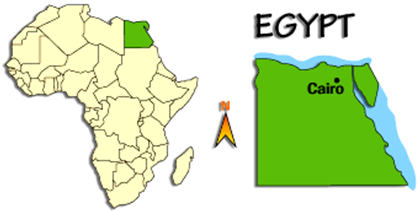 xxxxxAs we have seen, the rule of the Turkish Ottomans was established in Egypt by Selim I in 1517 (H8), and it remained in force until the end of the 18th century -
xxxxxAs we have seen, the rule of the Turkish Ottomans was established in Egypt by Selim I in 1517 (H8), and it remained in force until the end of the 18th century -
xxxxxHe succeeded in defeating the Egyptian army at the Battle of the Pyramids, but his attempt to govern the country, however laudable his intentions, aroused much opposition. There was general resentment against foreign interference. Furthermore, his stay was cut short by Nelson’s victory at the Battle of the Nile, which destroyed the French fleet and left his army stranded. After an unsuccessful attempt to capture Acre and conquer Syria, he again defeated the Egyptians -
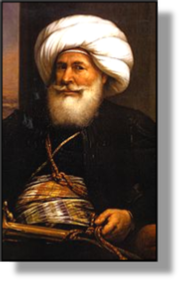 xxxxxThe French occupation of Egypt, brief though it was, had a significant impact on the country’s future, bringing it for the first time into the orbit of European politics and making it a future bone of contention between France and Britain. Once the French had been expelled in 1801, however, the British soon left -
xxxxxThe French occupation of Egypt, brief though it was, had a significant impact on the country’s future, bringing it for the first time into the orbit of European politics and making it a future bone of contention between France and Britain. Once the French had been expelled in 1801, however, the British soon left -
xxxxxOnce officially recognised, the new viceroy massacred the bulk of the Mamluks -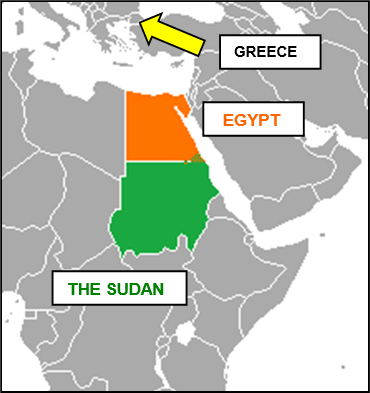 To gain control of the local slave trade and push out his frontiers, in 1811 he launched a war against the Wahhabis, an heretical Muslim group which had occupied the holy cities of Mecca and Medina in Arabia. After a bitter conflict, the campaign was successfully concluded by his son, Ibrahim Pasha in 1818. Then in 1820 he sent an army up the Nile to attack
To gain control of the local slave trade and push out his frontiers, in 1811 he launched a war against the Wahhabis, an heretical Muslim group which had occupied the holy cities of Mecca and Medina in Arabia. After a bitter conflict, the campaign was successfully concluded by his son, Ibrahim Pasha in 1818. Then in 1820 he sent an army up the Nile to attack
xxxxxThen in 1824, given the promise by the Sultan of more territorial gains, he played a prominent role in a war for independence which had been raging in Greece since 1821. Via a fleet of sixty vessels he sent an army to mainland Greece (arrowed on map) to assist in the overthrow of the Greek insurgents. Commanded by Ibrahim Pasha, it had overrun most of the Morea (the Peloponnese peninsular of southern Greece) in less than two years. But the rapid success of this military operation was sufficient to alarm a number of European states. The Russians, British and French came out in support of Greece, and in 1827 won the Battle of Navarino (now Pilos) against a combined Turko-
xxxxxHowever, this setback in no way put an end to his expansionist policies. Indeed, in 1831 he took on his Turkish overlord and became master of Syria for close on ten years. As we shall see, he was obliged to give up this conquest in 1840 (Va), but not before he had gained recognition as the hereditary ruler of Egypt -
Including:
Muhammad Ali and
Christian Gottfried
Ehrenberg

xxxxxIt was in the early 1820s, when Muhammad Ali began his invasion of the Sudan, that the country was visited by the German naturalist Christian Gottfried Ehrenberg (1795-
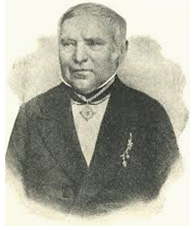 xxxxxEhrenberg was the first biologist to make a study of fossil microorganisms -
xxxxxEhrenberg was the first biologist to make a study of fossil microorganisms -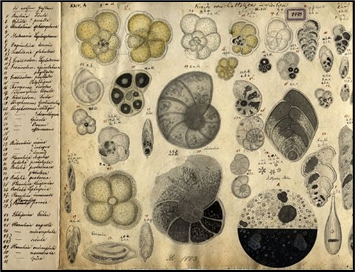 Dongola, published in 1828, and his The Infusoria (i.e.Protozoa) as Complete Organisms, produced ten years later, a treatise in which he argued that all animals, regardless of size, have complete organ systems, such as stomachs and sex organs. Illustrated here is one of the original, detailed sketches of unicellular organisms, produced mostly during the 1830s.
Dongola, published in 1828, and his The Infusoria (i.e.Protozoa) as Complete Organisms, produced ten years later, a treatise in which he argued that all animals, regardless of size, have complete organ systems, such as stomachs and sex organs. Illustrated here is one of the original, detailed sketches of unicellular organisms, produced mostly during the 1830s.
xxxxxHe was elected a foreign member of the Royal Society in 1837 and, two years later, won the Wollaston Medal, the highest prize awarded by the Geological Society of London. The “Ehrenberg Collection” at Berlin University includes 40,000 microscopic preparations, 5,000 raw samples, and some 3,000 pencil and ink drawings.
xxxxxIncidentally, the city of Khartoum in The Sudan was so named because it was established near the confluence of the Blue and White Nile on a spit of land which resembled an elephant’s trunk -
xxxxxIt was in 1820, the year Muhammad Ali invaded the Sudan, that the German naturalist Christian Gottfried Ehrenberg (1795-
G4-


